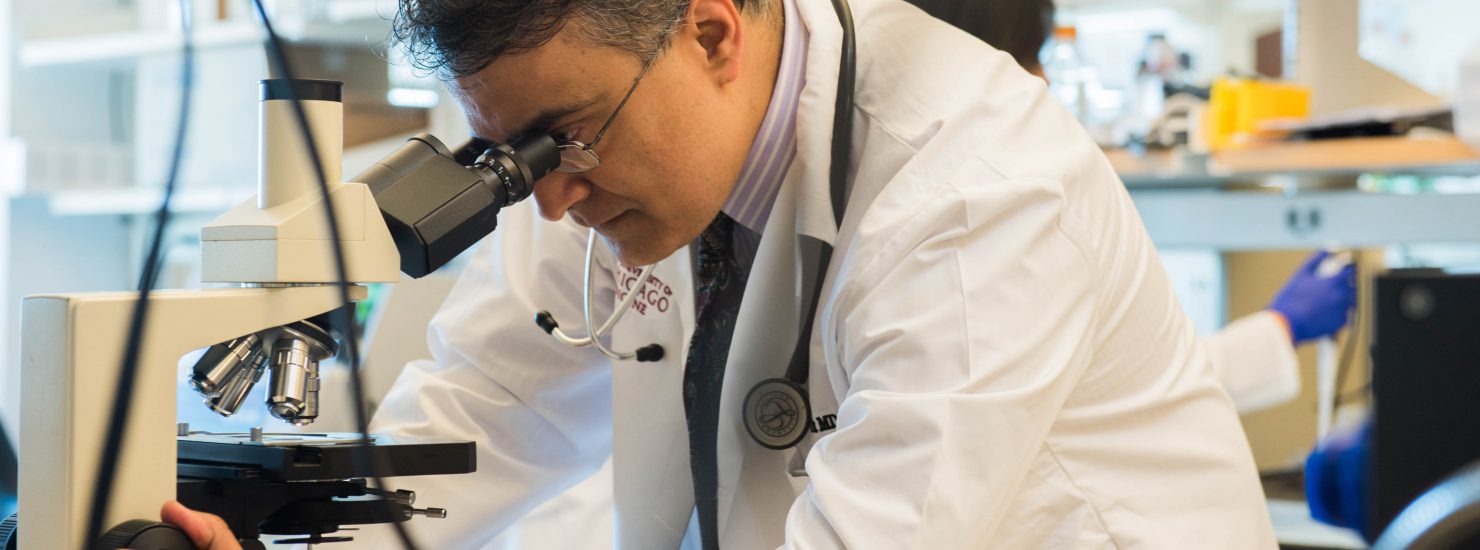Research Programs
Overview
The University of Chicago Hematology/Oncology section conducts a wide range of cutting edge research for advancements in the treatment of cancer in both the laboratory and clinical setting. Some of our basic research includes the following fields: developmental biology and genetics, cellular biology including intracellular pathways and signal transduction, drug resistance and development, cytogenetics, tumor immunology, transplant biology, and protein targeting. Much of our basic research carries over into clinical studies. With our clinical research, the Hematology/Oncology section believes in a multimodality (a combination of treatments) and multi-disciplinary approach that includes laboratory research and clinical research in our pursuit for the best treatment and care for our patients. One of the only institutions to have clinical trials in Phase I, Phase II, and Phase III of drug development, the distinguished faculty have ongoing investigations in each of these phases. By interacting with cooperative research groups like the Alliance for Clinical Trials in Oncology , our cancer program is able to offer advantages to patients with all types of cancer by having access to top research teams across the U.S. and the world.
Clinical Research
The Section of Hematology/Oncology has a very robust and successful clinical research program. Currently over 250 industry sponsored clinical trials are available to patients with:
- Leukemia
- Lymphoma
- Lung Cancer
- Head and neck cancer
- Breast cancer
- GI Cancer
- Genitourinary Cancer
- Mesothelioma
- Melanoma
- Other solid tumors.
In addition, the Section of Hematology/Oncology is one of only a handful of institutions in the country to conduct clinical trials in Phase I, Phase II, and Phase III drug development. A Phase I trial is the first step for physicians to determine whether a potential drug can be tolerated. Presently the Section is the recipient of a Phase I grant that provides novel cancer therapies to patients who have not responded to established therapies. Phase II trials occur after a potential treatment is found to be tolerated in Phase I trials. Our clinical researchers study the effectiveness of the treatment on a specific type of cancer in a small group of patients. Phase III trials occur after Phase II generally in larger groups of patients to compare the experimental treatment’s effectiveness against standard therapy for a particular type of cancer. We are the headquarters for CALGB, Cancer and Leukemia Group B, a national network of 29 university medical centers, over 225 community hospitals and more than 3,000 oncology specialists who collaborate in clinical research studies
The main objective of our clinical research initiative is to identify less toxic and more effective treatment regimens for all types of cancers. As a result, we have discovered many innovative and cutting edge cancer therapies which often are not available at other institutions.
The majority of the faculty is dedicated to clinical research efforts and are assisted by a team of research nurses, data and regulatory coordinators who serve to facilitate data management of ongoing trials, organization of responsibilities of ancillary study staff, and coordination of follow up for patients involved in ongoing clinical trials.

